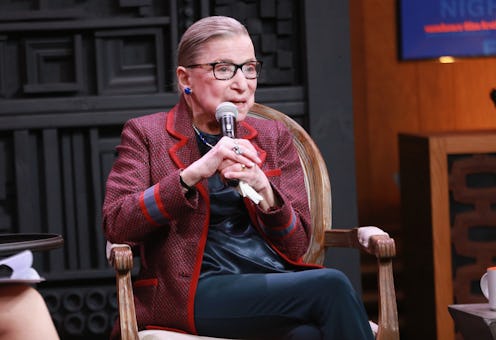
On Sunday, U.S. Supreme Court Justice Ruth Bader Ginsburg sat down for an interview at Columbia University with Poppy Harlow of CNN. During the interview, Justice Ginsburg heavily praised the #MeToo movement, saying that it is "amazing ... that for the first time, women are really [being] listened to ..." Ginsburg also shared a personal story to illustrate why sexual harassment is such a pervasive problem that needs to be readily remedied.
When discussing the movement, Ginsburg applauded it for giving women a voice that has long been missing. As Ginsburg put it, " ... On the whole, it's amazing to me that for the first time, women are really listened to. Because sexual harassment had often been dismissed as, well, 'she made it up' or 'she's too thin-skinned,' so I think it's a very healthy development."
Earlier in the interview, Ginsburg also shared one of her own experiences with sexual harassment, which highlighted the importance of the #MeToo movement. In telling what she described as one of "many stories" that she could recite about the topic, Ginsburg noted that, when she was a student at Cornell University, she had asked a chemistry professor for extra help to prepare for an upcoming exam. In response, he had given Ginsburg a "practice exam," which she later found out was the real examination. Ginsburg reflected on the incident, saying, "I knew just what he expected in return." She also revealed that she had confronted the professor and said, "How dare you?" after realizing what he had done.
Harlow also asked Ginsburg if she felt like Congress is "listening and acting fast enough" to support the #MeToo movement. In response, Ginsburg replied, "Is this Congress acting fast enough? Congress is not acting. But we will get past this time of inaction." She also added, "... I mean it's been very hard even to keep the government going lately."
Ginsburg further shared her hope for the future when it comes to Congress, revealing, "My hope is that Congress will think about people — where the United States population now is, and I am putting my faith in the millennials."
Regardless of how quickly Congress acts, however, Ginsburg seems to think that the #MeToo movement is here to stay, noting that she believes it is "too widespread" to encounter serious backlash. However, Ginsburg did indicate that she does have some concern about ensuring that the movement helps everyone — not just people who are well-known. As Ginsburg put it:
My concern is that it shouldn't stop with prominent people, people like you [Harlow], people in the media ... that this new attitude should protect the maid who works at a hotel. And I think it is spreading so far. Yes, there will always be adjustments when there's a transition, but, on the whole ...
Sunday does not mark the first time Ginsburg has spoken about the #MeToo movement. Indeed, in January, during an interview at the Sundance Film Festival, Ginsburg praised the merits of the movement and also again revealed that she was not concerned about backlash:
I think it’s about time ... For so long women were silent, thinking there was nothing you could do about it. But now the law is on the side of women or men who encounter harassment, and that’s a good thing ... Let’s see where it goes. So far, it’s been great ... When I see women appearing every place in numbers I’m less worried about backlash than I might have been 20 years ago.
Overall, it is clear that Justice Ginsburg believes that the #MeToo movement has given women a much-needed and long-awaited voice — and she will likely continue to be a strong supporter of the movement as it seeks to effect further change in the United States and beyond.